
Raoul Dufy Painting Reproductions 1 of 1
1877-1953
French Fauvist Painter
Raoul Dufy (3 June 1877 - 23 March 1953) was a French Fauvist painter. He developed a colourful, decorative style that became fashionable for designs for ceramics, textiles and decorative schemes for public buildings. He is noted for scenes of open-air social events.
Raoul Dufy was born at Le Havre, in Normandy, one of a family of nine members. He left school at the age of 14 to work in a coffee importing company. In 1895 when he was 18, he started evening classes in art at Le Havre Ecole des Beaux-Arts. He and Othon Friesz, a school friend, studied the works of Eugene Boudin in the museum in Le Havre.
In 1900, after a year of military service, Raoul won a scholarship enabling him to attend the Ecole Nationale des Beaux-Arts in Paris, where he was a fellow student with Georges Braque. The impressionist landscapists, such as Claude Monet and Camille Pissarro, influenced him.
Introduced to Berthe Weill in 1902, she showed his work in her gallery. Henri Matisse's Luxe, Calme et Volupte, which Dufy saw at the Salon des Independants in 1905, was a revelation to the young artist and directed his interest towards Fauvism. Les Fauves (wild beasts) emphasised bright colour and rich bold contours in their work, and Dufy's painting reflects this approach until about 1909, when contact with the work of Paul Cezanne led him to adopt a somewhat subtler technique. It was not until 1920, after he had flirted briefly with yet another style, cubism, that Dufy developed his own distinctive approach involving skeletal structures, arranged in a diminished perspective, and the use of light washes of colour put on by swift brush strokes in a manner that came to be known as stenographic.
Dufy's cheerful oils and watercolours depict yachting scenes, sparkling views of the French Riviera, chic parties and musical events. The optimistic and fashionably decorative and illustrative nature of much of his work has meant that his output is less highly critically valued than artists who treat a wider range of social concerns.
In 1938, Dufy completed one of the largest paintings ever done, a huge and immensely popular epic to electricity, the fresco La Fee Electricite for the Exposition Internationale in Paris.
Dufy also acquired a reputation as an illustrator and an applied artist. He changed the face of fashion and fabric design with his work for Paul Poiret. He painted murals for public buildings, and produced a prodigious number of tapestries and ceramic designs. His plates appear in books by Guillaume Apollinaire, Stephane Mallarme and Andre Gide.
Dufy died near Forcalquier, France, on 23 March 1953, and was buried not far from Matisse in the Cimiez Monastery Cemetery in Cimiez, a suburb of the city of Nice, France.
Raoul Dufy was born at Le Havre, in Normandy, one of a family of nine members. He left school at the age of 14 to work in a coffee importing company. In 1895 when he was 18, he started evening classes in art at Le Havre Ecole des Beaux-Arts. He and Othon Friesz, a school friend, studied the works of Eugene Boudin in the museum in Le Havre.
In 1900, after a year of military service, Raoul won a scholarship enabling him to attend the Ecole Nationale des Beaux-Arts in Paris, where he was a fellow student with Georges Braque. The impressionist landscapists, such as Claude Monet and Camille Pissarro, influenced him.
Introduced to Berthe Weill in 1902, she showed his work in her gallery. Henri Matisse's Luxe, Calme et Volupte, which Dufy saw at the Salon des Independants in 1905, was a revelation to the young artist and directed his interest towards Fauvism. Les Fauves (wild beasts) emphasised bright colour and rich bold contours in their work, and Dufy's painting reflects this approach until about 1909, when contact with the work of Paul Cezanne led him to adopt a somewhat subtler technique. It was not until 1920, after he had flirted briefly with yet another style, cubism, that Dufy developed his own distinctive approach involving skeletal structures, arranged in a diminished perspective, and the use of light washes of colour put on by swift brush strokes in a manner that came to be known as stenographic.
Dufy's cheerful oils and watercolours depict yachting scenes, sparkling views of the French Riviera, chic parties and musical events. The optimistic and fashionably decorative and illustrative nature of much of his work has meant that his output is less highly critically valued than artists who treat a wider range of social concerns.
In 1938, Dufy completed one of the largest paintings ever done, a huge and immensely popular epic to electricity, the fresco La Fee Electricite for the Exposition Internationale in Paris.
Dufy also acquired a reputation as an illustrator and an applied artist. He changed the face of fashion and fabric design with his work for Paul Poiret. He painted murals for public buildings, and produced a prodigious number of tapestries and ceramic designs. His plates appear in books by Guillaume Apollinaire, Stephane Mallarme and Andre Gide.
Dufy died near Forcalquier, France, on 23 March 1953, and was buried not far from Matisse in the Cimiez Monastery Cemetery in Cimiez, a suburb of the city of Nice, France.
10 Raoul Dufy Paintings
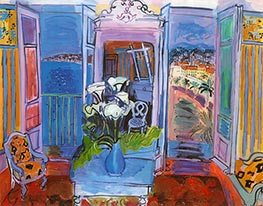
Interior with Open Windows 1928
Oil Painting
$768
$768
Canvas Print
$60.09
$60.09
SKU: DUR-3957
Raoul Dufy
Original Size: 66 x 82 cm
Private Collection
Raoul Dufy
Original Size: 66 x 82 cm
Private Collection
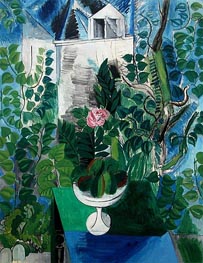
Jardin et maison au Havre 1915
Oil Painting
$672
$672
Canvas Print
$58.13
$58.13
SKU: DUR-3958
Raoul Dufy
Original Size: unknown
Modern Art Museum of the City of Paris, Paris, France
Raoul Dufy
Original Size: unknown
Modern Art Museum of the City of Paris, Paris, France
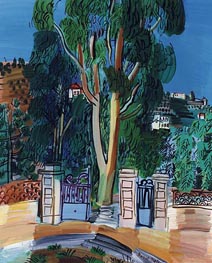
The Eucalyptus c.1926/27
Oil Painting
$536
$536
Canvas Print
$64.49
$64.49
SKU: DUR-3959
Raoul Dufy
Original Size: 55.3 x 46 cm
Private Collection
Raoul Dufy
Original Size: 55.3 x 46 cm
Private Collection
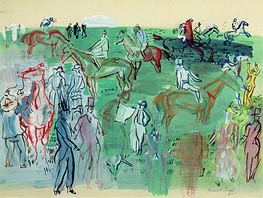
Racegoers on the Lawn 1941
Paper Art Print
$48.29
$48.29
SKU: DUR-11000
Raoul Dufy
Original Size: 50.8 x 66.1 cm
Private Collection
Raoul Dufy
Original Size: 50.8 x 66.1 cm
Private Collection
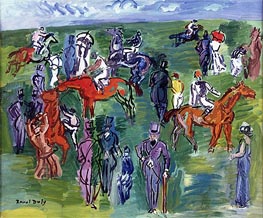
Aux Courses n.d.
Oil Painting
$554
$554
SKU: DUR-11003
Raoul Dufy
Original Size: 46 x 55 cm
Private Collection
Raoul Dufy
Original Size: 46 x 55 cm
Private Collection
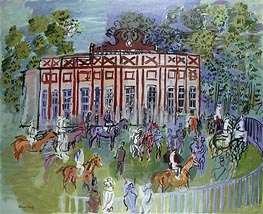
The Paddock at Chantilly 1939
Oil Painting
$766
$766
SKU: DUR-11005
Raoul Dufy
Original Size: 81 x 100 cm
Private Collection
Raoul Dufy
Original Size: 81 x 100 cm
Private Collection
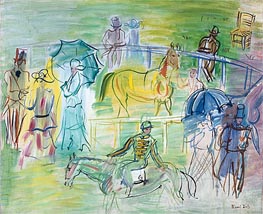
Paddock n.d.
Paper Art Print
$48.29
$48.29
SKU: DUR-11008
Raoul Dufy
Original Size: 59.7 x 73 cm
Fred Jones Jr. Museum of Art at University of Oklahoma, Oklahoma, USA
Raoul Dufy
Original Size: 59.7 x 73 cm
Fred Jones Jr. Museum of Art at University of Oklahoma, Oklahoma, USA
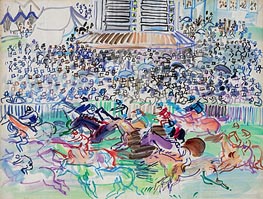
The Races at Epsom 1938
Paper Art Print
$48.29
$48.29
SKU: DUR-11148
Raoul Dufy
Original Size: 50.5 x 66 cm
Private Collection
Raoul Dufy
Original Size: 50.5 x 66 cm
Private Collection
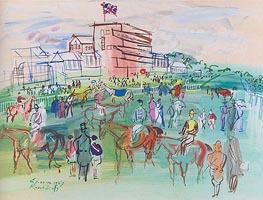
Front of the Grandstand 1937
Paper Art Print
$55.75
$55.75
SKU: DUR-15965
Raoul Dufy
Original Size: 50.2 x 65.4 cm
Private Collection
Raoul Dufy
Original Size: 50.2 x 65.4 cm
Private Collection